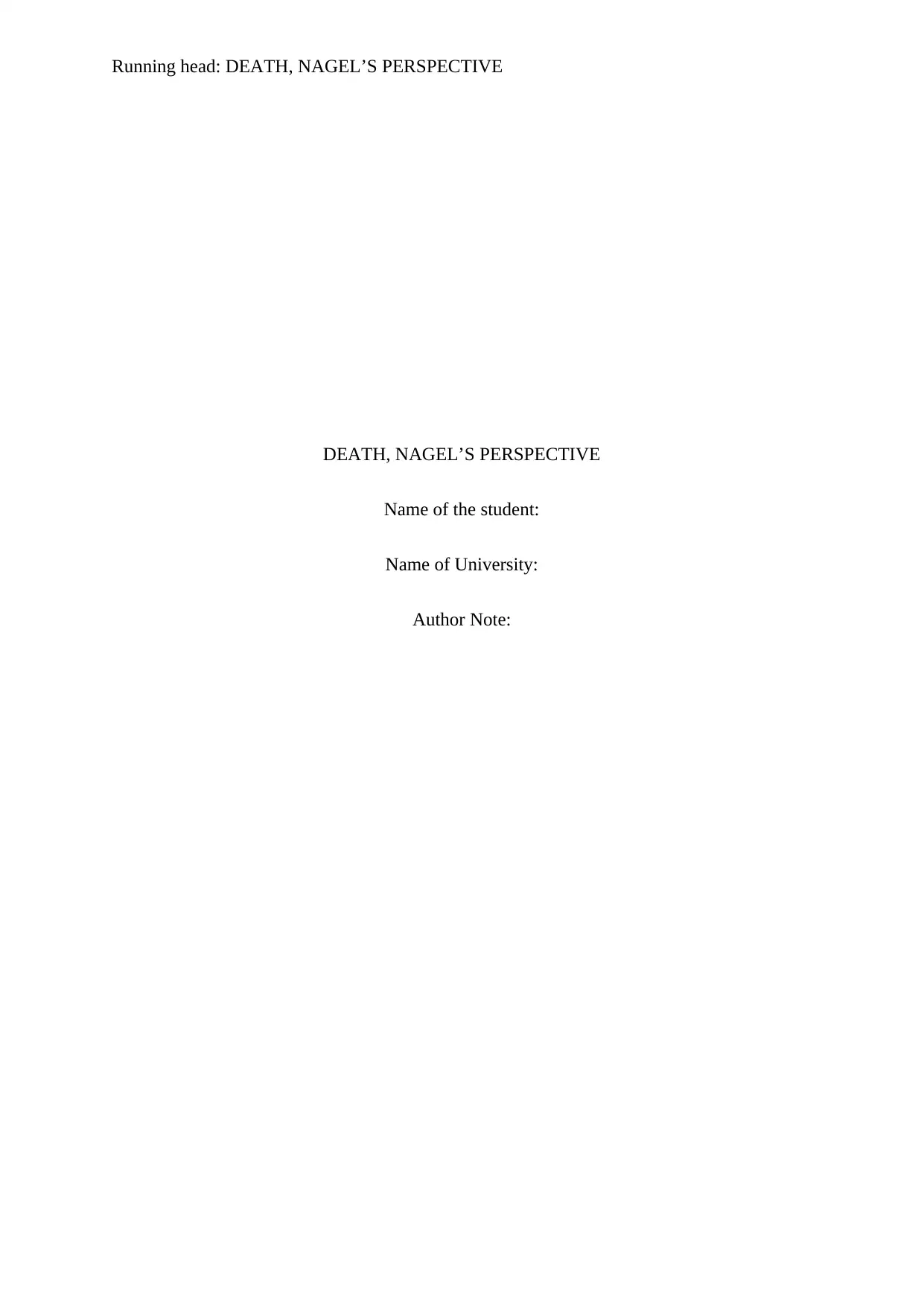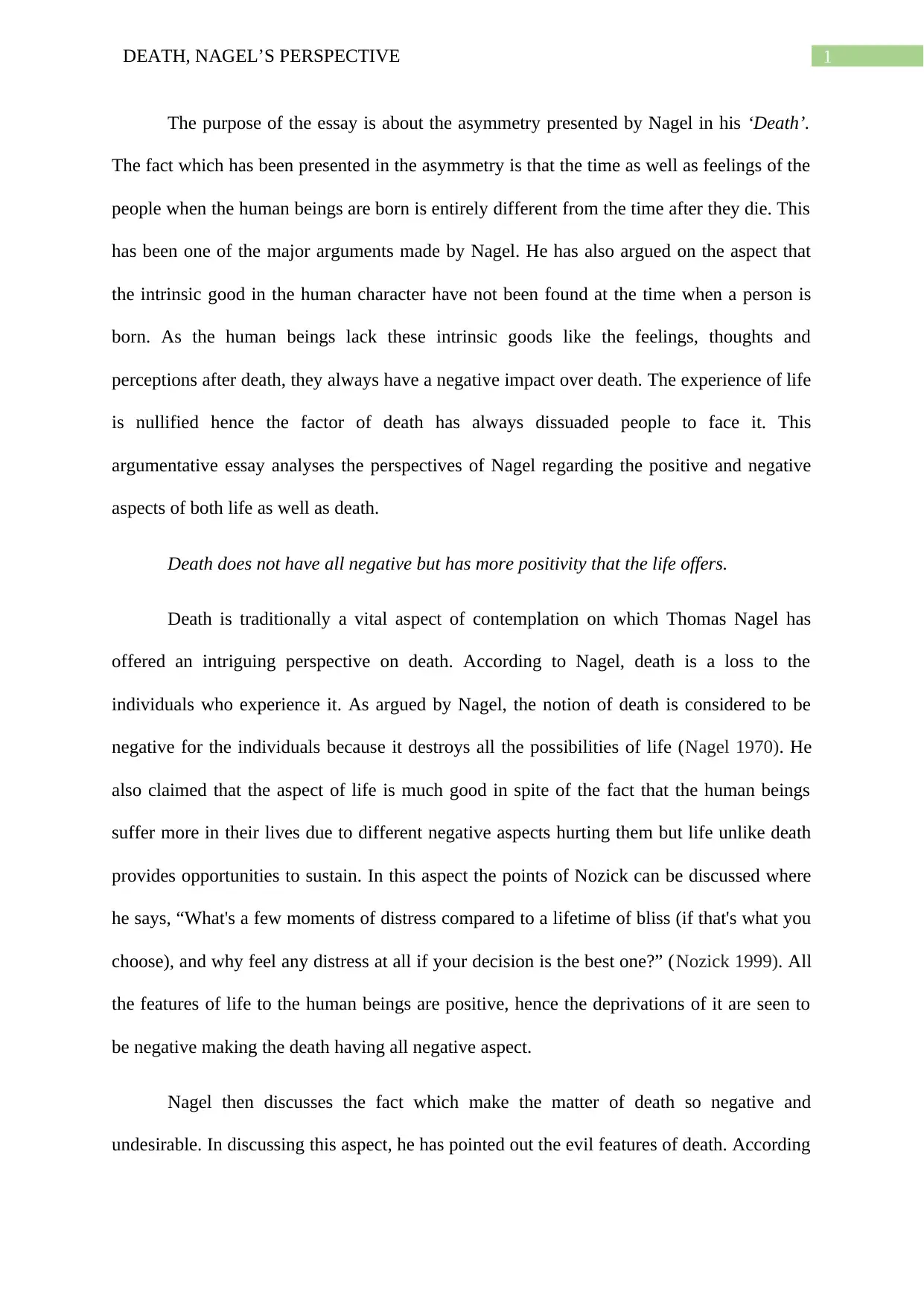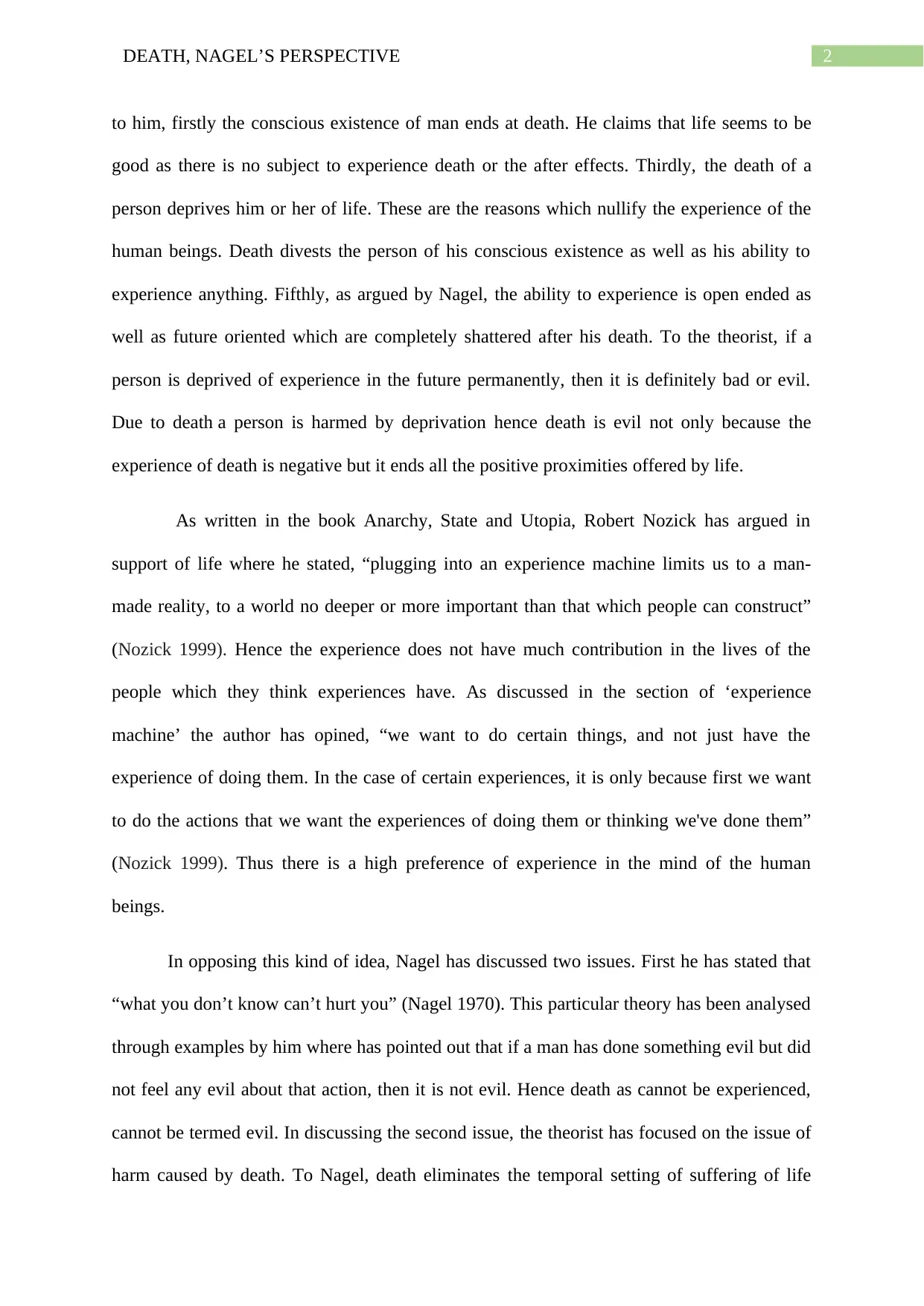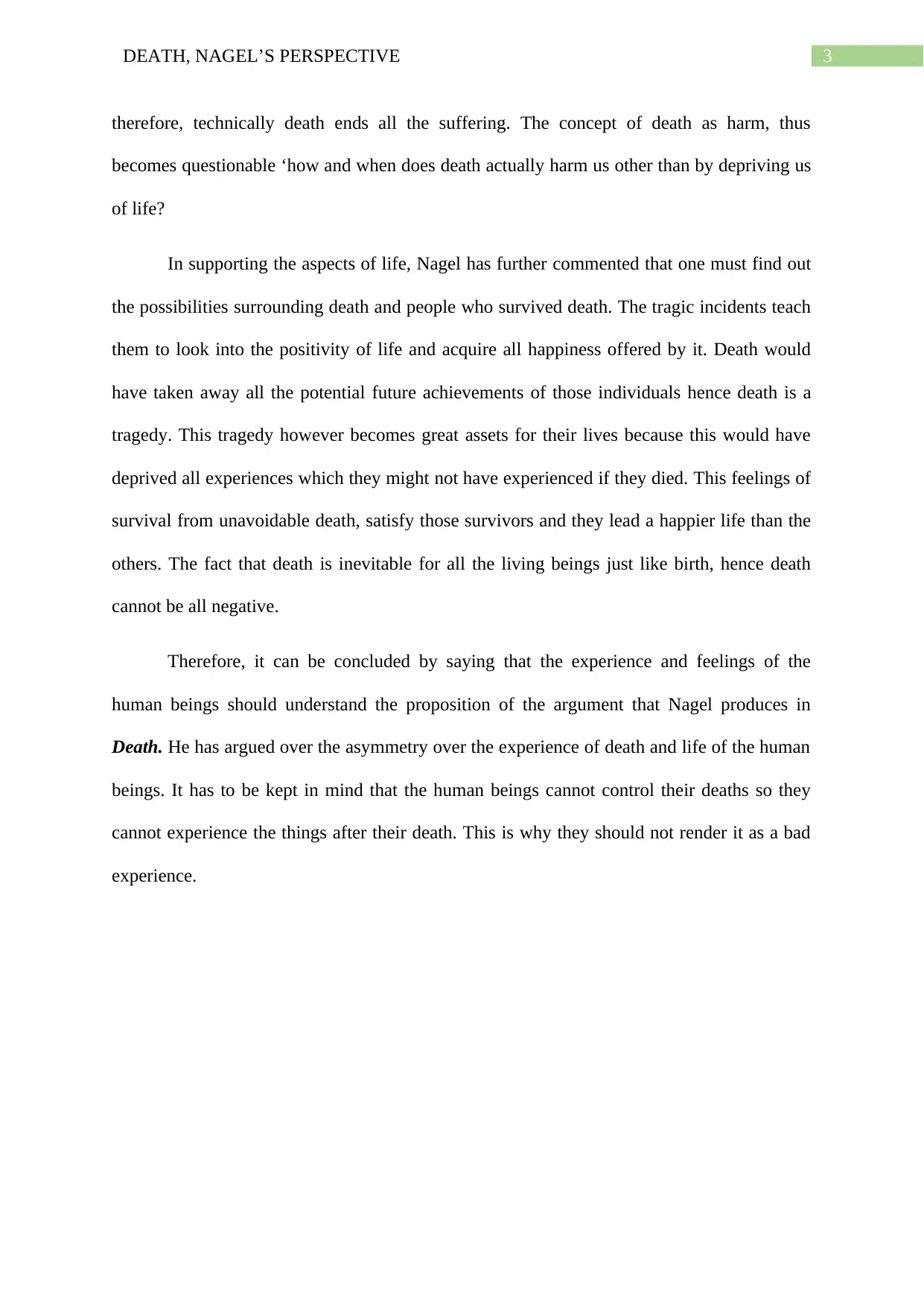Critical Analysis of Thomas Nagel's Argument on the Badness of Death
VerifiedAdded on 2023/06/13
|5
|1196
|446
Essay
AI Summary
This essay delves into Thomas Nagel's philosophical perspective on death, focusing on the asymmetry he presents between the time before birth and after death. Nagel argues that death is considered negative due to the deprivation of life's possibilities, despite life's inherent suffering. The essay explores Nagel's points on the evil features of death, such as the end of conscious existence and the deprivation of future experiences. It also discusses Robert Nozick's counterarguments about the value of experience, as well as Nagel's rebuttals, including the idea that 'what you don't know can't hurt you.' The essay concludes by emphasizing the importance of understanding Nagel's arguments and recognizing that death, while inevitable, should not be viewed solely as a negative experience, given that human beings cannot control or experience what happens after it. Desklib provides resources for students to explore similar philosophical discussions.

Running head: DEATH, NAGEL’S PERSPECTIVE
DEATH, NAGEL’S PERSPECTIVE
Name of the student:
Name of University:
Author Note:
DEATH, NAGEL’S PERSPECTIVE
Name of the student:
Name of University:
Author Note:
Paraphrase This Document
Need a fresh take? Get an instant paraphrase of this document with our AI Paraphraser

1DEATH, NAGEL’S PERSPECTIVE
The purpose of the essay is about the asymmetry presented by Nagel in his ‘Death’.
The fact which has been presented in the asymmetry is that the time as well as feelings of the
people when the human beings are born is entirely different from the time after they die. This
has been one of the major arguments made by Nagel. He has also argued on the aspect that
the intrinsic good in the human character have not been found at the time when a person is
born. As the human beings lack these intrinsic goods like the feelings, thoughts and
perceptions after death, they always have a negative impact over death. The experience of life
is nullified hence the factor of death has always dissuaded people to face it. This
argumentative essay analyses the perspectives of Nagel regarding the positive and negative
aspects of both life as well as death.
Death does not have all negative but has more positivity that the life offers.
Death is traditionally a vital aspect of contemplation on which Thomas Nagel has
offered an intriguing perspective on death. According to Nagel, death is a loss to the
individuals who experience it. As argued by Nagel, the notion of death is considered to be
negative for the individuals because it destroys all the possibilities of life (Nagel 1970). He
also claimed that the aspect of life is much good in spite of the fact that the human beings
suffer more in their lives due to different negative aspects hurting them but life unlike death
provides opportunities to sustain. In this aspect the points of Nozick can be discussed where
he says, “What's a few moments of distress compared to a lifetime of bliss (if that's what you
choose), and why feel any distress at all if your decision is the best one?” (Nozick 1999). All
the features of life to the human beings are positive, hence the deprivations of it are seen to
be negative making the death having all negative aspect.
Nagel then discusses the fact which make the matter of death so negative and
undesirable. In discussing this aspect, he has pointed out the evil features of death. According
The purpose of the essay is about the asymmetry presented by Nagel in his ‘Death’.
The fact which has been presented in the asymmetry is that the time as well as feelings of the
people when the human beings are born is entirely different from the time after they die. This
has been one of the major arguments made by Nagel. He has also argued on the aspect that
the intrinsic good in the human character have not been found at the time when a person is
born. As the human beings lack these intrinsic goods like the feelings, thoughts and
perceptions after death, they always have a negative impact over death. The experience of life
is nullified hence the factor of death has always dissuaded people to face it. This
argumentative essay analyses the perspectives of Nagel regarding the positive and negative
aspects of both life as well as death.
Death does not have all negative but has more positivity that the life offers.
Death is traditionally a vital aspect of contemplation on which Thomas Nagel has
offered an intriguing perspective on death. According to Nagel, death is a loss to the
individuals who experience it. As argued by Nagel, the notion of death is considered to be
negative for the individuals because it destroys all the possibilities of life (Nagel 1970). He
also claimed that the aspect of life is much good in spite of the fact that the human beings
suffer more in their lives due to different negative aspects hurting them but life unlike death
provides opportunities to sustain. In this aspect the points of Nozick can be discussed where
he says, “What's a few moments of distress compared to a lifetime of bliss (if that's what you
choose), and why feel any distress at all if your decision is the best one?” (Nozick 1999). All
the features of life to the human beings are positive, hence the deprivations of it are seen to
be negative making the death having all negative aspect.
Nagel then discusses the fact which make the matter of death so negative and
undesirable. In discussing this aspect, he has pointed out the evil features of death. According

2DEATH, NAGEL’S PERSPECTIVE
to him, firstly the conscious existence of man ends at death. He claims that life seems to be
good as there is no subject to experience death or the after effects. Thirdly, the death of a
person deprives him or her of life. These are the reasons which nullify the experience of the
human beings. Death divests the person of his conscious existence as well as his ability to
experience anything. Fifthly, as argued by Nagel, the ability to experience is open ended as
well as future oriented which are completely shattered after his death. To the theorist, if a
person is deprived of experience in the future permanently, then it is definitely bad or evil.
Due to death a person is harmed by deprivation hence death is evil not only because the
experience of death is negative but it ends all the positive proximities offered by life.
As written in the book Anarchy, State and Utopia, Robert Nozick has argued in
support of life where he stated, “plugging into an experience machine limits us to a man-
made reality, to a world no deeper or more important than that which people can construct”
(Nozick 1999). Hence the experience does not have much contribution in the lives of the
people which they think experiences have. As discussed in the section of ‘experience
machine’ the author has opined, “we want to do certain things, and not just have the
experience of doing them. In the case of certain experiences, it is only because first we want
to do the actions that we want the experiences of doing them or thinking we've done them”
(Nozick 1999). Thus there is a high preference of experience in the mind of the human
beings.
In opposing this kind of idea, Nagel has discussed two issues. First he has stated that
“what you don’t know can’t hurt you” (Nagel 1970). This particular theory has been analysed
through examples by him where has pointed out that if a man has done something evil but did
not feel any evil about that action, then it is not evil. Hence death as cannot be experienced,
cannot be termed evil. In discussing the second issue, the theorist has focused on the issue of
harm caused by death. To Nagel, death eliminates the temporal setting of suffering of life
to him, firstly the conscious existence of man ends at death. He claims that life seems to be
good as there is no subject to experience death or the after effects. Thirdly, the death of a
person deprives him or her of life. These are the reasons which nullify the experience of the
human beings. Death divests the person of his conscious existence as well as his ability to
experience anything. Fifthly, as argued by Nagel, the ability to experience is open ended as
well as future oriented which are completely shattered after his death. To the theorist, if a
person is deprived of experience in the future permanently, then it is definitely bad or evil.
Due to death a person is harmed by deprivation hence death is evil not only because the
experience of death is negative but it ends all the positive proximities offered by life.
As written in the book Anarchy, State and Utopia, Robert Nozick has argued in
support of life where he stated, “plugging into an experience machine limits us to a man-
made reality, to a world no deeper or more important than that which people can construct”
(Nozick 1999). Hence the experience does not have much contribution in the lives of the
people which they think experiences have. As discussed in the section of ‘experience
machine’ the author has opined, “we want to do certain things, and not just have the
experience of doing them. In the case of certain experiences, it is only because first we want
to do the actions that we want the experiences of doing them or thinking we've done them”
(Nozick 1999). Thus there is a high preference of experience in the mind of the human
beings.
In opposing this kind of idea, Nagel has discussed two issues. First he has stated that
“what you don’t know can’t hurt you” (Nagel 1970). This particular theory has been analysed
through examples by him where has pointed out that if a man has done something evil but did
not feel any evil about that action, then it is not evil. Hence death as cannot be experienced,
cannot be termed evil. In discussing the second issue, the theorist has focused on the issue of
harm caused by death. To Nagel, death eliminates the temporal setting of suffering of life
⊘ This is a preview!⊘
Do you want full access?
Subscribe today to unlock all pages.

Trusted by 1+ million students worldwide

3DEATH, NAGEL’S PERSPECTIVE
therefore, technically death ends all the suffering. The concept of death as harm, thus
becomes questionable ‘how and when does death actually harm us other than by depriving us
of life?
In supporting the aspects of life, Nagel has further commented that one must find out
the possibilities surrounding death and people who survived death. The tragic incidents teach
them to look into the positivity of life and acquire all happiness offered by it. Death would
have taken away all the potential future achievements of those individuals hence death is a
tragedy. This tragedy however becomes great assets for their lives because this would have
deprived all experiences which they might not have experienced if they died. This feelings of
survival from unavoidable death, satisfy those survivors and they lead a happier life than the
others. The fact that death is inevitable for all the living beings just like birth, hence death
cannot be all negative.
Therefore, it can be concluded by saying that the experience and feelings of the
human beings should understand the proposition of the argument that Nagel produces in
Death. He has argued over the asymmetry over the experience of death and life of the human
beings. It has to be kept in mind that the human beings cannot control their deaths so they
cannot experience the things after their death. This is why they should not render it as a bad
experience.
therefore, technically death ends all the suffering. The concept of death as harm, thus
becomes questionable ‘how and when does death actually harm us other than by depriving us
of life?
In supporting the aspects of life, Nagel has further commented that one must find out
the possibilities surrounding death and people who survived death. The tragic incidents teach
them to look into the positivity of life and acquire all happiness offered by it. Death would
have taken away all the potential future achievements of those individuals hence death is a
tragedy. This tragedy however becomes great assets for their lives because this would have
deprived all experiences which they might not have experienced if they died. This feelings of
survival from unavoidable death, satisfy those survivors and they lead a happier life than the
others. The fact that death is inevitable for all the living beings just like birth, hence death
cannot be all negative.
Therefore, it can be concluded by saying that the experience and feelings of the
human beings should understand the proposition of the argument that Nagel produces in
Death. He has argued over the asymmetry over the experience of death and life of the human
beings. It has to be kept in mind that the human beings cannot control their deaths so they
cannot experience the things after their death. This is why they should not render it as a bad
experience.
Paraphrase This Document
Need a fresh take? Get an instant paraphrase of this document with our AI Paraphraser

4DEATH, NAGEL’S PERSPECTIVE
References:
Nagel, Thomas. "Death." Noûs (1970): 73-80.
Nozick, Robert. 1999. Anarchy, State, And Utopia. Oxford: Basil Blackwell.
References:
Nagel, Thomas. "Death." Noûs (1970): 73-80.
Nozick, Robert. 1999. Anarchy, State, And Utopia. Oxford: Basil Blackwell.
1 out of 5
Related Documents
Your All-in-One AI-Powered Toolkit for Academic Success.
+13062052269
info@desklib.com
Available 24*7 on WhatsApp / Email
![[object Object]](/_next/static/media/star-bottom.7253800d.svg)
Unlock your academic potential
Copyright © 2020–2025 A2Z Services. All Rights Reserved. Developed and managed by ZUCOL.





